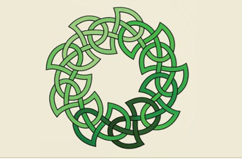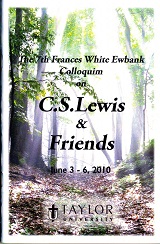Event Title
Academic Paper Session III-A
Location
Rupp 203
Start Date
5-6-2010 9:30 AM
Description
"Tale as Old as Time: A Study of the Cupid & Psyche Myth, with Particular Reference to C.S. Lewis's Till We Have Faces" - John Stanifer
In 1956, C.S. Lewis saw the publication of his final novel, Till We Have Faces. Considered by Lewis himself to be among his best work, the novel’s plot is essentially a reworking of the myth of Cupid and Psyche, a myth first recorded in Apuleius’s Metamorphoses. In this presentation, I will trace the various adaptations of the Cupid and Psyche myth and its echoes in works as various as the poetry of John Milton, Stephenie Meyer’s Twilight novels, and Disney’s Beauty and the Beast. What do all these stories have in common? Come listen and find out.
"Sucking Life: The Principle of Hell in Screwtape" - Kimberly Moore-Jumonville
Screwtape’s training of Wormwood in the art of deception exposes the tempters’ desire to consume “the other” completely into the self. This insatiable appetite to devour is revealed to be the ruling principle of Hell, where one must eat or be eaten. As competitors, Screwtape and Wormwood can never comprehend the reality of Heaven, which exists by the opposite principle. If the rule of Hell is to consume the other, the rule of Heaven is to serve and celebrate the other. In The Screwtape Letters C.S. Lewis succeeds in depicting the choice to succumb to appetite or submit to a service that is perfect freedom.
"The End for Which We Are Formed: C.S. Lewis's Theology of Spiritual Formation" - Robert Moore-Jumonville
For years readers have practiced spiritual formation through C.S. Lewis, without using that term. This paper first will lay out Lewis’s definition of spiritual formation. We have no choice whether or not we are being formed spiritually. The soul of each of us is shaped through the sum of our creaturely choosing: choices which are transforming us moment by moment into either a more heavenly or more hellish being. Always pastoral in his concern, Lewis offers a compelling spiritual theology of human nature. As spiritual mentor, he wins us over by willingly siding with us in our trenches of battle. Examples from The Screwtape Letters will be offered to illustrate Hell’s mission of throwing our choosing off track.
Event Type
Paper
Academic Paper Session III-A
Rupp 203
"Tale as Old as Time: A Study of the Cupid & Psyche Myth, with Particular Reference to C.S. Lewis's Till We Have Faces" - John Stanifer
In 1956, C.S. Lewis saw the publication of his final novel, Till We Have Faces. Considered by Lewis himself to be among his best work, the novel’s plot is essentially a reworking of the myth of Cupid and Psyche, a myth first recorded in Apuleius’s Metamorphoses. In this presentation, I will trace the various adaptations of the Cupid and Psyche myth and its echoes in works as various as the poetry of John Milton, Stephenie Meyer’s Twilight novels, and Disney’s Beauty and the Beast. What do all these stories have in common? Come listen and find out.
"Sucking Life: The Principle of Hell in Screwtape" - Kimberly Moore-Jumonville
Screwtape’s training of Wormwood in the art of deception exposes the tempters’ desire to consume “the other” completely into the self. This insatiable appetite to devour is revealed to be the ruling principle of Hell, where one must eat or be eaten. As competitors, Screwtape and Wormwood can never comprehend the reality of Heaven, which exists by the opposite principle. If the rule of Hell is to consume the other, the rule of Heaven is to serve and celebrate the other. In The Screwtape Letters C.S. Lewis succeeds in depicting the choice to succumb to appetite or submit to a service that is perfect freedom.
"The End for Which We Are Formed: C.S. Lewis's Theology of Spiritual Formation" - Robert Moore-Jumonville
For years readers have practiced spiritual formation through C.S. Lewis, without using that term. This paper first will lay out Lewis’s definition of spiritual formation. We have no choice whether or not we are being formed spiritually. The soul of each of us is shaped through the sum of our creaturely choosing: choices which are transforming us moment by moment into either a more heavenly or more hellish being. Always pastoral in his concern, Lewis offers a compelling spiritual theology of human nature. As spiritual mentor, he wins us over by willingly siding with us in our trenches of battle. Examples from The Screwtape Letters will be offered to illustrate Hell’s mission of throwing our choosing off track.


